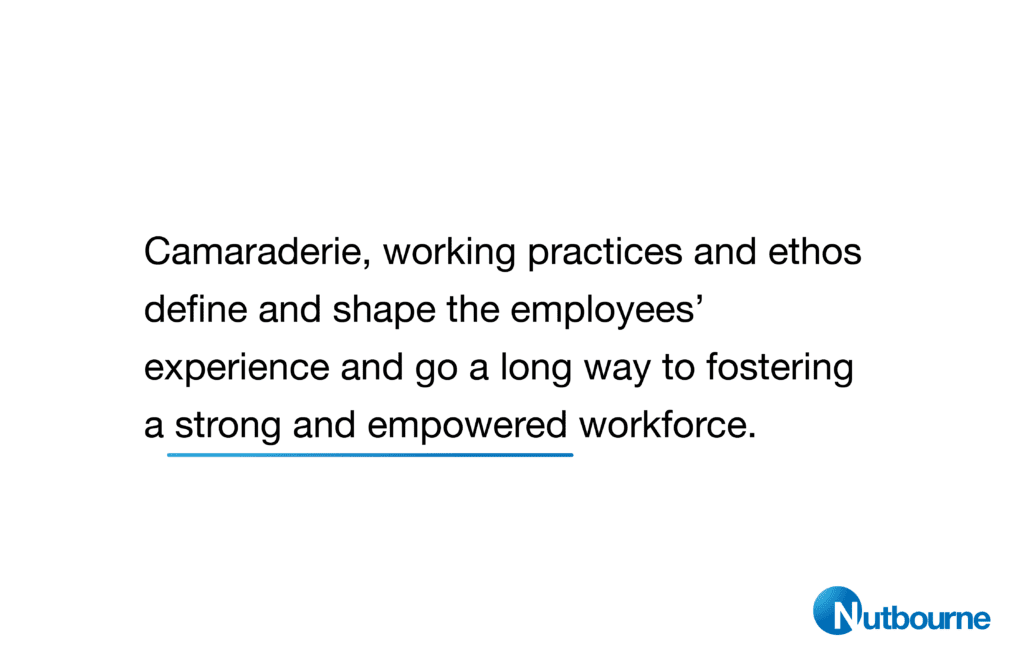Whether your company is new to working from home or has embraced the practise for years, there will be aspects of remote working you can improve. And as organisations across the UK and around the world plan their approach for distanced working practices, the quality of the home-working experience should be high on the agenda.
And while infrastructure, hardware and software are important aspects of that, it is the people working from home that matter the most. Getting the best from your teams is challenging, and ensuring the experience is positive for every individual is just as hard. So, what can you do?
We spoke to Marcus Evans, MD of managed services provider, Nutbourne, to get his tips and views on deploying a remote workforce, embedding sound practices and policies into the organisation’s ethos and building a thriving home-working culture.
Make efforts to unite a siloed workforce
When it comes to your workforce, the most important aspect is the company culture. Camaraderie, working practices and ethos define and shape the employees’ experience and go a long way to fostering a strong and empowered workforce that delivers results for the organisation. During lockdown, this was difficult to circumvent; and as we enter an era where the workforce will split between days in and out of the office, keeping teams united will be just as hard – but nonetheless very important.
“I think short term, we may not find too much of a problem. People are all in the same boat, recognise what we’re doing and that it’s a siloed workforce,” says Marcus. “We’ve made sure our teams buddy up and call each other daily, even just for five minutes. We’ve hosted social events to keep spirits up. To our knowledge, this is something fairly unusual amongst IT support companies.
“The scenario changes long-term. For example, if you have new team members that aren’t embedded into the company culture and haven’t had the opportunity to meet their colleagues in person, then that will be big challenge. It poses a lot of questions. How do you make sure that the new people bond as well with the people who are legacy company employees? How do you make sure that their wellbeing is met when you don’t know them as well?
“For me it’s very much a case of keeping people talking and interacting. Culture is so important, and it can be as simple as five people talking around a table about nothing in particular and reinforcing it. During the lockdown period and as restrictions ease, we’ll make continued efforts to unite siloed workers by encouraging groups chats over Zoom and by hosting remote social events. That way, the company can stay engaged and nobody feels left out.”
Continue to build and foster a growth mentality
One of the things that a lot of SMEs will have been working towards is growth, but fostering that mentality throughout lockdown will have been neglected – or at the least not optimal – because it needs consistent input and monitoring over long periods of time. So, what does that look like in the medium to long-term?
“It’s a chicken and egg scenario,” says Marcus. “If you’ve employed people with a growth mindset, and they’re passionate and hungry, then they’ll find a way to push those characteristics, whatever the mechanics. From a practical perspective, we’ve continued to offer training via Zoom, so those individuals can pursue their natural proclivity to improve their performance and get better in areas that are key to their overall growth.
“If they don’t have a growth mentality, well is that a problem? You typically find this in your new starters who’ve never had a role before, and they’ve just gone straight out of university and don’t really know what to expect. It’s very easy for them to get into bad habits, and they may not realise that there’s a lot of growing you can do at work. How do you foster it with them? Well, again, you’ve got to lead by example, you’ve got to do your best to make sure your senior management team work with them and try and help them. As a managed services provider, we view managing our own staff as just as vital as that of the services we provide.
“What you can do is keep offering training, make it available. Remind them that training courses are there if they want them. Put as much out in front of them, and do that as much as you can. Track in their one-on-ones, whether they’re taking it up or not – if not you may need to be a little more creative.”

Be aware of people’s circumstances – and help where you can
Having less contact time with your teams inevitably means you can’t always monitor exactly how or why a team member’s performance is dropping or why a normally able individual is struggling. You need to pay particular attention to these people because there is likely more going on than meets the eye.
“People who can’t work remotely are going to really struggle. Lots of people don’t work well from home. If this was a normal scenario I would ask them to come into the office and work with others – extroverts tend to prefer this way of working.
“Right now, we can’t do that. So, we continue to have one-on-ones with them, touch base with them, do our best to keep track of what they’re doing. And it feels like micromanaging, which isn’t ideal – but it’s better than letting someone struggle.
“A lot of it comes down to what their home work environment is like, what their space is like. Is it a crowded house? Are there lots of people around? Do they find it productive? And there’s not much you can do about their home because you can’t go there and plan it out like you have planned out your office to make sure it conductive to work. All you can do is try and help them and support them.” Support, it seems then, runs beyond purely the IT support at this company.

Keep on top of quality
“This is really important because it sets the tone for the company,” says Marcus. “If your team feel like they’re doing a good job they’ll feel empowered which is good for morale, self-esteem and for the company overall. If you can back this up with numbers such as KPIs, then so much the better.
“We’ve actually seen a drop off in tickets resolved, which at face value might seem like we’re not working as hard. But if you dig beneath the surface, it’s because we’ve had a drop off in overall tickets. And actually, what we’re seeing is an improvement in client satisfaction rate – up from 95% to 98%. So, our teams are doing very well overall, and we make sure to let them know that.
“We’ve also set a competition for our technical team to write as many articles as they can for internal knowledge base. These guides, troubleshooting pages and best practise pieces help to raise the overall standard of knowledge and output within the group. And because they’re written by our people on the ground, they feel as though they have real ownership over that aspect of improving the company.”
Whilst some people may believe that IT lends itself well to home working, this isn’t always the case. Even if technically speaking, it’s viable, that doesn’t necessarily factor in the human aspect. That’s why it’s vital to us, as a managed services provider, to support our staff as well as our clients. If you’d like to find out more about our company, and our vast experience as a managed services provider, then get in touch! Contact Nutbourne today on 0203 137 7273.
